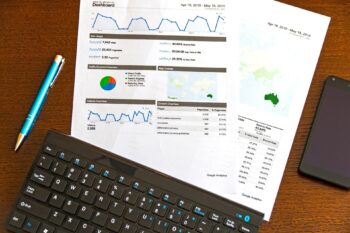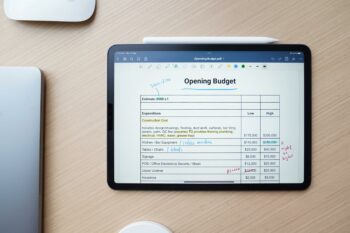How to Choose the Best Tax Accountants?
Nov 2022
Get the right financial support at a price that suits you.
Choosing the best tax accountant is an important choice for any business. They can ensure that your tax returns are completed with the right paperwork, and make sure you don’t overpay or deal with HMRC if you are owed money.
But finding that tax accountant is difficult in and of itself.
What kind of financial support do you need? Not all tax accountancy services are created equally. We’ll run you through a checklist to ensure that you choose the best tax accountant for your business.
Let’s jump in.

Why is it good to have a tax accountant?
There are many benefits of having a tax accountant.
Stay tax compliant
Staying compliant with HMRC on your taxes is something you absolutely need. As a business, you need to keep your paperwork up-to-date flawlessly. If you haven’t dotted the i’s and crossed t’s, then you could be called up by a surprise audit from HMRC.
The best tax accountants stay up-to-date on the latest changes in tax law. With the incoming tax changes in April 2023, are you ready if a surprise tax audit from HMRC arrives?
Beyond that, by filing your taxes flawlessly you will also avoid any financial recriminations. Make a mistake once, and you’ll have to pay fines and fees to HMRC. But, if you start making a habit of mistakes when it comes to taxes, then the fees will slam down even harder.
Reduce your tax bill
Even the best tax accountants are not miracle workers, but they do have some tricks up their sleeves.
Corporation tax, NICs, Dividends and Patent Boxes, tax accountants know how to make the most of what you have. They can prove that a particular expense counts for a particular tax relief. They can examine and categorise expenses in the way that benefits you the most while remaining within the bounds of financial law.
As much as you think that you’ve done, a good tax accountant will discover home office expenses, charitable donations and other business expenses that can help lower your overall tax bill.

When do I need a tax accountant?
There are a few key times in your life when you will need the help of a tax accountant.
These include:
When you launch your own startup
There are a lot of tax implications to starting your own business, and a good tax accountant can help you navigate them all. From helping you with equity compensation, to simply filing away all the official documents that need to be filed! Perhaps your business is experiencing dramatic growth or you’re not exactly sure how that Making Tax Digital scheme works.
It’s a weight off your chest at a time when you have enough on your plate. As a Startup, your mind should be fixated on your business and the potential opportunities ahead of you!
When you buy a property
Again, there are many tax implications to buying property, so it’s important to have someone who knows what they’re doing on your side.
This can either be when you launch your Startup and finally get hold of some office space, or if you’re simply a business that’s expanding, relocating or upgrading your existing headquarters.
When you have a complex financial situation:
If your finances are complicated, it’s a good idea to get help from a professional tax accountant so that you don’t make any mistakes on your taxes. Your business might have just started importing and exporting products, or as a sole trader you could be thinking of becoming a Limited Company. Both of these involve a lot of complex tax work.
The costs of hiring a good tax accountant are far less than the potential fees, fines and recriminatory sanctions that HMRC will introduce on your business!

Improve your cash flow with analytics
What does a good tax accountant need to be?
A good tax accountant should be properly qualified and have a wealth of experience to draw upon.
Qualifications of a Good Accountant
Accountants should be chartered or certified so that you know they are fully qualified for the roles, responsibilities and undertakings that you require of them. They will hold indemnity insurance and be regulated by an association.
If an accountant is chartered or certified, it means that they have to complete a certain amount of continuous professional development (CPD) every single year.
But how can you tell if an accountant is chartered or certified? Well, it will be in their name of course!
- ACA
Member of the Institute of Chartered Accountants
- FCA
Member of the Institute of Chartered Accountants for 10+ years
- ACCA
Member of the Chartered Association of Certified Accountants
- FCCA
Member of the Chartered Association of Certified Accountants for 10+ years
- CTA
Member of the Chartered Institute of Taxation
These are just some (but not all!) of the reputable examples of qualified accountants.
Experience of a good accountant
For a tax accountant, you need to find the right firm. One that has a history, and a successful history, of dealing with tax problems.
This is especially important when it comes to Startups.
A tax accountant who specialises in high-value divorces will not have the depth of business knowledge as a specialised tax accountant for Startups. They will have a head for numbers and a great deal of specific knowledge, absolutely. But it’s akin to asking a sprinter to compete in the hurdles. They’ll be far better than the average bystander, but no match for a professional in that field.
So examine your tax accountancy firms closely and check out their case studies, their success stories and the reviews from previous clients (if there are any!)
As a bonus, these experienced tax accountants will also have many useful contacts, especially if they work with Startups. You’ll find that they work with experienced R&D tax credit services, CFOs and more that you can make use of and form long-lasting, profitable relationships.

Once you find a tax accountant
If you think you’ve identified the right tax accountant for you, you still need to make contact with them. So let’s set down a few ground rules for both you and your potential accountant.
Talk with them
Accountants don’t lurk in small offices surrounded by numbers, they’re people too! Just don’t talk too loudly, or you may frighten them…
But be prepared that when you meet them, you will require paperwork to prove your identity.
Due to the money laundering act, you do need to provide photographic evidence of identity such as a passport or driving licence, and proof of address, such as a utility bill.
It’s as much for their safety as it is for yours, so be understanding.
Know what you want
You don’t necessarily have to understand the ins and outs of the processes that they perform,, but you do have to know what you are doing.
As long as you are crystal clear in your projections for the future, what your business is doing, and how you are performing it, you shouldn’t have any trouble communicating clearly with your potential tax accountant.
If they’re very good, they will not only outline what you need and the services involved, but they will also immediately spot things that you had not yet noticed.
Cost & time frame
Talking about costs is often an awkward conversation, but you’re a business so you should be used to it by now. You want your taxes handled at a low price, so have a figure in mind, but keep some breathing room around that figure.
But remember that cheap does not necessarily mean good.
Value for money, ironically, is priceless.
You should also have a realistic time frame outlined. Are you looking for a one-off tax accountant to handle stuff quickly? If so, have you really set enough time in advance?
Tax accountants have a huge amount of work to deal with on a regular basis, and it may be that to juggle an urgent need, you’ll have to pay extra for them to put other projects on hold.
In terms of value, it’s far better to keep a tax accountant on a regular basis, plan ahead of any quarterly issues and give both you and the accountant breathing room to deal with HMRC deadlines.

How much does a tax accountant cost?
This can vary a lot.
This is partially based on the accountancy firm involved. If you grab top-notch tax accountants from a prestigious London firm then you’ll pay through the nose to get it. On the other hand a single accountant above a dry cleaner will be far cheaper.
But will they fulfil your needs?
The cost of a tax accountant will also vary depending on the style of your business.
At the most basic level of tax return, you’d probably pay a minimum of around £200-300, whereas for capital gains submissions and property disposal it would be £500-600.
On the other hand, a sole trader would have to pay £450+ depending upon the state of your books, the total turnover and how many transactions are on the books. As a limited company with more complex tax regulations, this would increase a great deal more.
Our take away
You need a tax accountant that’s experienced, qualified and can complete the services required at a decent price. One that’s easy to contact, and more importantly, knows about business.
That’s where our accountancy services thrive.
We are the #1 financial partner for startups. We started as one ourselves after all! All of our accountants are not only qualified and experienced, but we appreciate business for what it is. We’ll prepare you for Year End accounts, keep you compliant and even check to see if you could take advantage of R&D tax relief.
We’ve helped Startups such as Bettor achieve their finance, tax and reporting compliance while they focussed on the growth essential for their success.
“I liked that they were tech-enabled but without sacrificing the benefits of having a human at the other end of the line when required...they were a partner we could grow with.”
With our tax accountants on hand, you’ll never have to worry about HMRC again, so reach out and contact us today to learn more about our services in depth. Remember to check out our School of Startups, the free database filled with guides, videos and podcasts developed by CEOs and founders of startups as they discuss how they made successes of their own businesses.
#1 finance partner for tech & e-commerce startups
- 100% online
- All in one accountancy, R&D and CFO services
- 9/10 customers recommend us

Educational content just for startups. As a member, you’ll get unlimited access to an extensive range of guides, blogs and advice to help you run and grow your business.


